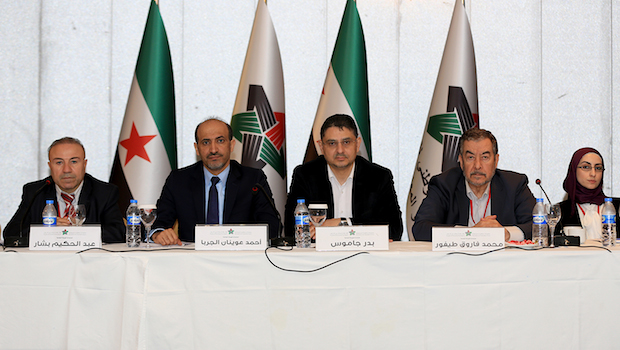Leaders of the Syrian National Coalition have come under attack in recent weeks. The attacks focus on accusations of corruption and the misuse of political funds, as well as the existence of secret groups supposedly forming the Coalition’s policies.
The attacks are also aimed at criticizing the political course of the Coalition in the past year—a period when a member of the Democratic bloc, Ahmed Al-Jarba, was president of the Coalition, and a number of Coalition members close to him took leading positions within it.
This situation is similar to that of today, whereby the new president, Hadi Al-Bahra, is also a member of the Democratic bloc and also has a number of close aides in leading positions in the Coalition.
The truth is that in both cases, the arrival of Jarba and Bahra, with their teams at the helm of the Coalition, came about through open,democratic processes and the ballot box. They defeated other candidates in contests that followed the Coalition’s rules—rules that were drafted by teams that did not include Jarba and Bahra, or any of their aides. This means that to question their right to hold the leadership is to be motivated by no more than spite. This is clear when the contents of the attacks in the media are analyzed.
The attackers’ claims of financial corruption are again no more than political and personal spite, because no evidence is offered to prove them, nor could it be, because it does not exist in the first place. This is especially clear when we consider the presence of powerful opponents to Jarba and Bahra within the Coalition, and the insistence of Jarba and Bahra’s teams on the participation of others in the activities of the Coalition, at both internal and external levels.
As for the alleged secret cliques within the Coalition, defining “secret clique” is causing some confusion. Does it include the leadership of the Coalition, which is probably where some of those who launched the attacks can be found? Or is it within a narrower circle, including the presidency and the circle of advisers and experts gathered around it?
In any case, it is not common for organizations to discuss issues that are strategically important openly and widely, especially if the organization, as in the case of the Coalition, faces a difficult and complex regional and international environment, and a bloody regime, with allies that are just as dangerous to Syrians and the Coalition.
And while the Coalition and its leadership in the past year did not claim to have carried out all that it should have, what is undoubtedly true is that it did try to make progress in a number of diplomatic and political fields, and with better results than the phase that preceded the arrival of the Democratic bloc led by Jarba.
Last year the Coalition managed to form a transitional government, and it functioned, even if its achievements were limited, as confirmed by the Democratic bloc, which participated in the dismissal of the government due to its failures. Representatives of the Kurdish National Council were included in order to broaden the political representation of Syrians in the Coalition.
The Coalition went to the Geneva II conference within the framework of the political battle with Syrian President Bashar Al-Assad’s regime, so as not to give him the opportunity to convince public opinion that he was “cooperating with the international community,” or that he would “accept political solutions,” or that the opposition, led by the Coalition, were mere “killers and extremists” who wanted to “depose the legitimate authority.”
The Coalition increased its diplomatic activity noticeably—activity which included dozens of meetings and visits to Arab and foreign capitals, in order to bolster its position and strengthen its position in the political equation, after almost being pushed out of it before the elevation of Jarba and his team to the presidency. It is worth remembering that the Coalition was not even invited to the Doha meeting in the summer of 2013.
It is true that the achievements noted above do not correspond to where the Coalition should be, as it faces a regime that has inflicted confusion and helplessness on the world through the crimes it has committed and the problems and challenges it has left in its wake. So, what would the Coalition’s situation be otherwise, with its limited resources amid a regional and international environment that is confused and unable to make serious decisions?
The Coalition, in its previous year of operation, built what was thought to be the foundation for plans to return to Syria. The strategy in mind was to work towards transferring the Coalition and the transitional government and its agencies, to a safe area inside Syria within the next few months. The fear was that the aim of the attacks on the Coalition and its previous and current leadership was to scupper this plan, which was supposed to include the whole Coalition and other Syrian activists from outside the Coalition.
The era of Jarba and his team has become part of the Coalition’s history, which we can judge with facts. As for the era of Bahra and his team, it is still ongoing, and we should wait until later to judge its results.
In any case, we must leave behind the era of political and personal spite, and anyone who has evidence of wrongdoing must present it to have it examined. If the evidence proves credible, then all those who committed violations should be held accountable. This issue is not debatable, and must not be debated.
